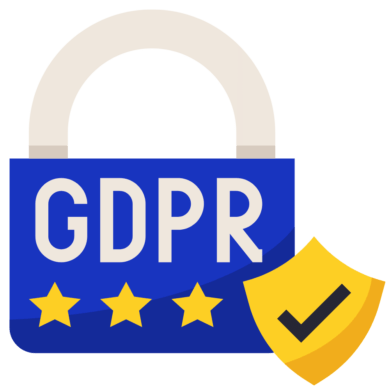Lawyer drafted & approved
Up to date with the latest laws in 2021
Compliant with GDPR, CalOPPA, CPPA, PIPEDA, Australian Privacy Act & more

There are 7 key principles in the GDPR they are:
These principles are central to the GDPR. They are not written out as exacting directions to be followed but rather taken as the essence of the regulation. Ensuring that your privacy policy covers and is compliant with these key principles is of extreme importance.


The GDPR sets out the rights of the individual as follows:
What do these rights mean to you? Check out our post on GDPR Compliance and your Privacy Policy for further information.

To be GDPR compliant, an organization must make sure that the personal data is collected in a lawful and transparent way, it is protected from misuse, maintained in a secure way and that they have appointed someone to be responsible for GDPR compliance.
To ensure your organization is GDPR compliant the GDPR.EU have compiled a checklist which you can access here: https://gdpr.eu/checklist
The GDPR is applicable to any organization who operates either inside or outside of the EU who obtains personal data for any reason from residents within the EU. So even if your business is located outside of the EU, you will be required to be GDPR compliant if you offer goods and services to residents of the EU.
This means that almost all organizations should have a GDPR compliant policy in place.
According to the GDPR an organization must supply a Privacy Policy that is:
Any organization obtaining personal information from an individual must include the following information in it's Privacy Policy:
Get your GDPR compliant privacy Policy here
CalOPPA applies to any organization or individual who operates a website or online service and collects personally identifying information from Californian residents. CalOPPA however doesn't apply to entities who store personally identifiable information for a third party.
Under CalOPPA the following are required:
Get your CalOPPA compliant privacy policy here


The Children's Online Privacy Protection Act is an United States federal law that has been in effect since April 21st 2001. Under this law websites must make it evident in their privacy policy whether they collect any personal information from children under 13 years of age. If your website is not targeting children under 13 years of age then it is best you do not collect any age information from your users and add a clause in your privacy Policy which clearly states that your website is not aimed at children under the age of 13.
For your COPPA compliant privacy policy here
A Privacy Policy is not just a legal requirement for your business or e-commerce store it is also a way to ensure you are fulfilling those legal requirements. Having a Privacy Policy also promotes trust with your clients and users as they are aware of how you are managing all aspects of their personal data.
Here is a quick checklist of some highly important components of your Privacy Policy for your business.


Yes even your personal blog is required to have a Privacy Policy. What you will need to include in this policy depends upon what type of data you are collecting from your users and if you are using affiliate links, advertising, if you are selling any products or services and/or providing your users with regular emails.
The following are some things you may want to include in your Privacy Policy:
A privacy policy is a statement or a legal document that is meant to help your users understand what information you collect, why you collect it and how they (your users) can update, manage or delete the information you collect.
Yes, you can use the template on privacyterms.io for free, we sell Lawyer Drafted Privacy Policy, compliant with major international Privacy Laws.
You can include multiple clauses based on what your business's data collection practices and other operations are related to your user's privacy.
Your privacy policy should be written in an unambiguous way and should not be hard to understand for your users. You should also disclose any information you collect from your users. See our list of what’s included.
Yes, you a cookie policy clause is included in the privacy policy. Some nations require you to include a cookie policy in your privacy policy. We recommend including this clause.
The California Consumer Privacy Act (CCPA) and the California Online Privacy Protection Act (CalOPPA) are both California state laws. Both of these acts are in place to protect the personal information of residents of California. Let's take a look at the similarities and differences between these two acts. Listen to this article in audio format […]
PIPEDA stands for Personal Information Protection and Electronic Documents Act. It is a federal privacy law which applies to private sector organizations in Canada who collect, use or disclose personal information for commercial activity. PIPEDA law regulates how businesses collect, use and disclose personal information from their customers for use in a commercial activity. But […]
CalOPPA stands for California Online Privacy Act. It is a state law of California which came into effect in 2004 and was amended to extend it's reach in 2012. It requires websites and online services to post a privacy policy on their websites if they collect any personally identifying information from residents in California, and […]
Why do you need a privacy policy if you use Google Analytics? Google Analytics, a free website analysis tool from Google, tracks traffic on your website by placing a cookie on visitors browsers and thereby collecting information. As part of Google Analytics Terms and Conditions you are required to have a privacy policy and secondly, […]
The Data Protection Act (DPA) 2018 is the UK's updated data protection law which became effective on 25th May 2018 and was recently amended on the 1st January 2021 to reflect the United Kingdom's exit from the EU. It sits alongside the UK GDPR and replaces the Data Protection Act 1998. The United Kingdom is […]
A Privacy Policy is a legal requirement for any business or website, but where should you put your Privacy Policy on your website? To be compliant with a number of International laws, including GDPR, CalOPPA and Australian Privacy Act 1988, your privacy policy is required to be in a prominent, easily located place on your […]
Whether you own a website, blog or eCommerce store you may find yourself wondering, do I need a privacy policy? The short answer is, if you collect personal data from your readers or users in any form, then yes you do need a privacy policy. The three most important reasons you will require a privacy […]